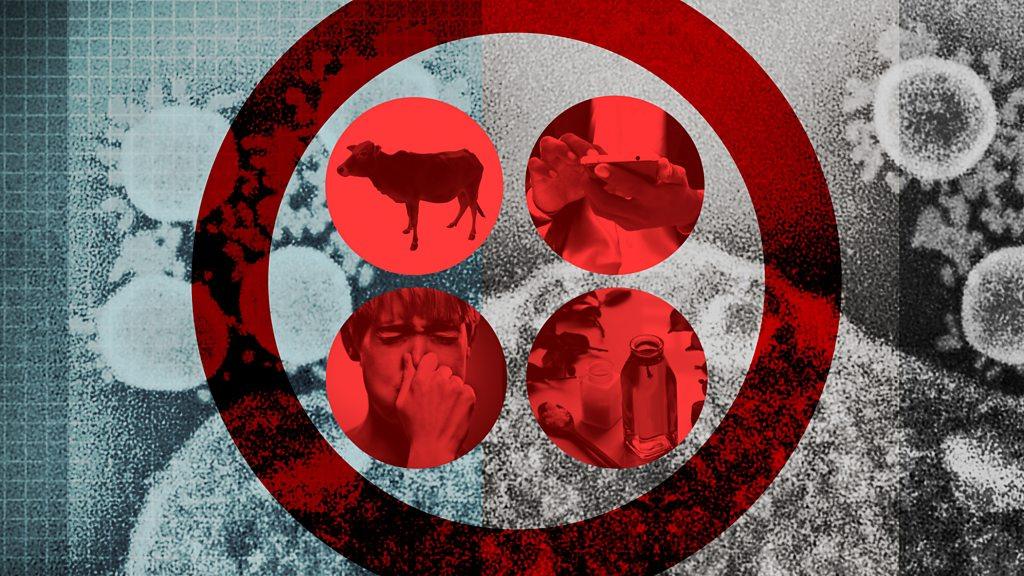Coronavirus: India enters 'total lockdown' after spike in cases
- Published
People panicked after Narendra Modi said nobody should leave their homes, and did not mention the status of essential supplies
India's Prime Minister Narendra Modi has imposed a nationwide lockdown in an attempt to slow the spread of the coronavirus.
The restrictions came into force at midnight local time (18:30 GMT) and will be enforced for 21 days.
"There will be a total ban on venturing out of your homes," Mr Modi said in a televised address.
He appealed for people not to panic - but crowds quickly mobbed stores in the capital, Delhi, and other cities.
Correspondents say it is not clear how - or even if - people will now be allowed out to buy food and other essentials.
The new measures follow a sharp increase in cases in recent days. There have been 519 confirmed cases across India and 10 reported deaths.
India - which has a population of 1.3bn - joins a growing list of countries that have imposed similar measures.
Nearly 400,000 people have tested positive for the virus worldwide, and around 17,000 have died.

THE LATEST: Live updates
A SIMPLE GUIDE: What are the symptoms?
AVOIDING CONTACT: Should I self-isolate?
MAPS AND CHARTS: Visual guide to the outbreak

"The entire country will be in lockdown, total lockdown," Mr Modi said on Tuesday.
He added: "To save India, to save its every citizen, you, your family... every street, every neighbourhood is being put under lockdown."
Mr Modi warned that if India does not "handle these 21 days well, then our country... will go backwards by 21 years".
"This is a curfew," he said. "We will have to pay the economic cost of this but [it] is the responsibility of everyone."
We explain why staying in is a matter of life and death
Mr Modi later warned that panic-buying would only spread the disease. He said the government would ensure supplies.
Allow X content?
This article contains content provided by X. We ask for your permission before anything is loaded, as they may be using cookies and other technologies. You may want to read X’s cookie policy, external and privacy policy, external before accepting. To view this content choose ‘accept and continue’.

But in Delhi and the financial capital, Mumbai, people fearing shortages quickly thronged shops and pharmacies.
"I have never witnessed such a chaos in my life," the owner of one store in the Shakarpur district of Delhi said, quoted by the Press Trust of India.
"All our stocks, including rice, flour, bread, biscuits, edible oils, have been sold out."
Police in the busy city of Ghaziabad, in Uttar Pradesh state, patrolled the streets with megaphones to tell residents to stay indoors.
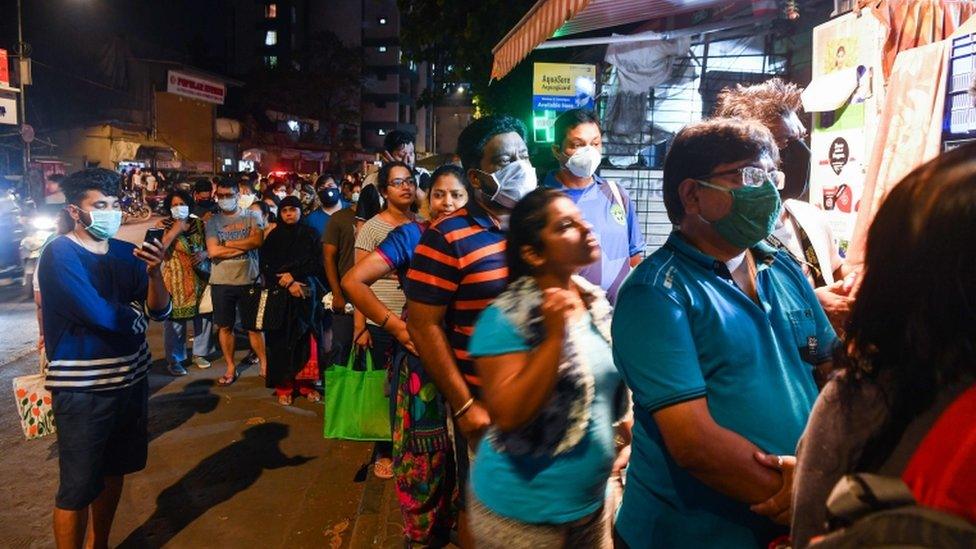
People in Mumbai rushed to stock up on essentials following Mr Modi's address
Under the new measures, all non-essential businesses will be closed but hospitals and other medical facilities will continue to function as normal. Schools and universities will remain shut and almost all public gatherings will be banned.
Anyone flouting the new rules faces up to two years in prison and heavy fines.
In his address, Prime Minister Modi also:
Stressed that the 21-day lockdown was "very necessary to break the chain of coronavirus"
Emphasised the seriousness of the situation and said that even developed countries had faced problems in combating it
Said that "social distancing was the only way to stop" the virus spreading
Announced that nearly $2bn (£1.8bn) would be made available to boost the country's health infrastructure
Called on people not to "spread rumours" and to follow instructions
His announcement came after several Indian states introduced measures of their own, such as travel restrictions and the closure of non-essential services.
India has already issued a ban on international arrivals and grounded domestic flights. The country's rail network has also suspended most passenger services.


Many parts of India, including cities such as Delhi and Mumbai, are already under tight restrictions. But this move extends those provisions to every corner of the country.
An earlier one-day curfew, which was seen as a trial, was flouted by many.
Mr Modi called on Indians to clap and cheer the emergency services from their balconies on Sunday. But many misunderstood the call and congregated in the streets as they danced and chanted.
"It's impossible to fathom the cost that India may have to pay if such irresponsible behaviour continues," Mr Modi warned at the time. "Social distancing is the only option to combat coronavirus."
The implications of a total lockdown in India are huge, not just economically, but socially.
This is a nation where community is everything. Going to worship at a temple, mosque or church is an essential part of daily life for so many.
This is a seismic cultural shift but - like the rest of the world facing similar restrictions - a necessary one.

What's the latest from around Asia?
Neighbouring Pakistan has almost twice as many confirmed cases - 878 as of Monday evening. Sweeping restrictions are in place although the government has stopped short of imposing a nationwide lockdown. However, several provinces have announced them independently. The army is being brought in to help enforce the restrictions
Bangladesh, which has reported 33 cases and three deaths, is also deploying its armed forces to help maintain social distancing and boost Covid-19 preventive measures. The soldiers will also monitor thousands of quarantined expatriate returnees. Across South Asia, there are concerns that the actual number of cases could be much higher than is being reported.
Indonesia, which has 49 confirmed Covid-19 deaths - the highest in South East Asia - has converted an athlete's village built for the 2018 Asian Games into a makeshift hospital for coronavirus patients. A state of emergency was declared in Jakarta on Monday
In Thailand, a month-long state of emergency which will include curfews and checkpoints will begin on Thursday. The government has been criticised for failing to take strong action so far. Four people have died and nearly 900 tested positive
The most populous country that was without a case until now - Myanmar - has announced two cases
And what about the rest of the world?
Elsewhere, governments are continuing to work to stem the spread of the virus which has now affected more than 190 countries worldwide
More than 2.6 billion people are in lockdown now India has introduced its new measures, according to a tally by the AFP news agency
Reality Check tackles misleading health advice being shared online
Europe remains at the epicentre of the pandemic. On Tuesday, the death toll jumped by 514 in a single day in Spain and other European countries also reported sharp increases
Italy is the worst affected country in the world in terms of deaths. The virus has killed almost 7,000 people there over the past month
The UK, meanwhile, is spending its first day under tight new restrictions. Prime Minister Boris Johnson announced unprecedented measures on Monday and ordered the immediate closure of shops selling non-essential goods
And in the US, New York's governor has said the federal government is not sending enough equipment to combat the crisis. The state has been hit especially hard by the virus
The World Health Organization (WHO) has warned that the US has the potential to become the new epicentre of the pandemic
In other developments, Japanese Prime Minister Shinzo Abe said the International Olympic Committee has agreed that the 2020 Tokyo Olympics should be postponed by a year
- Published25 March 2020
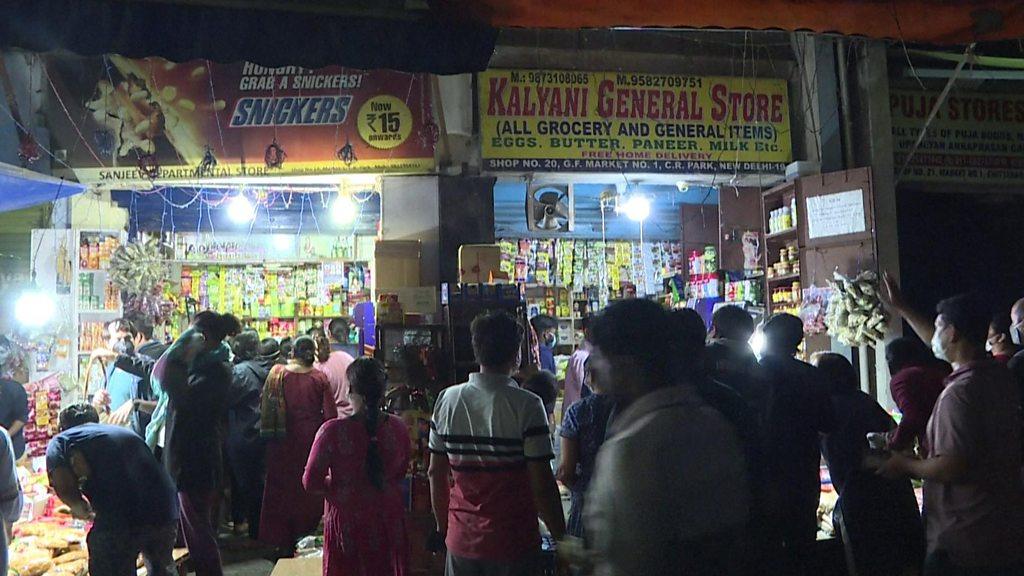
- Published25 March 2020
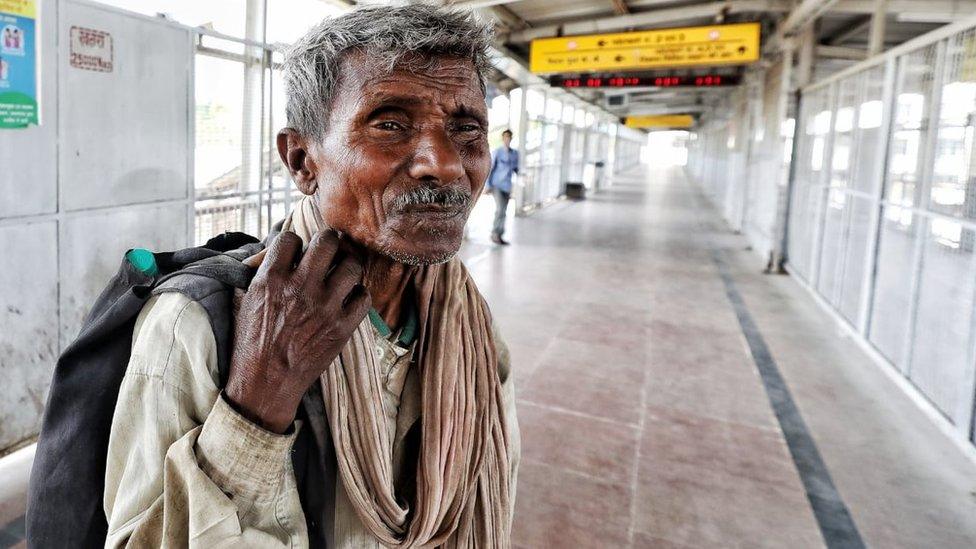
- Published24 March 2020
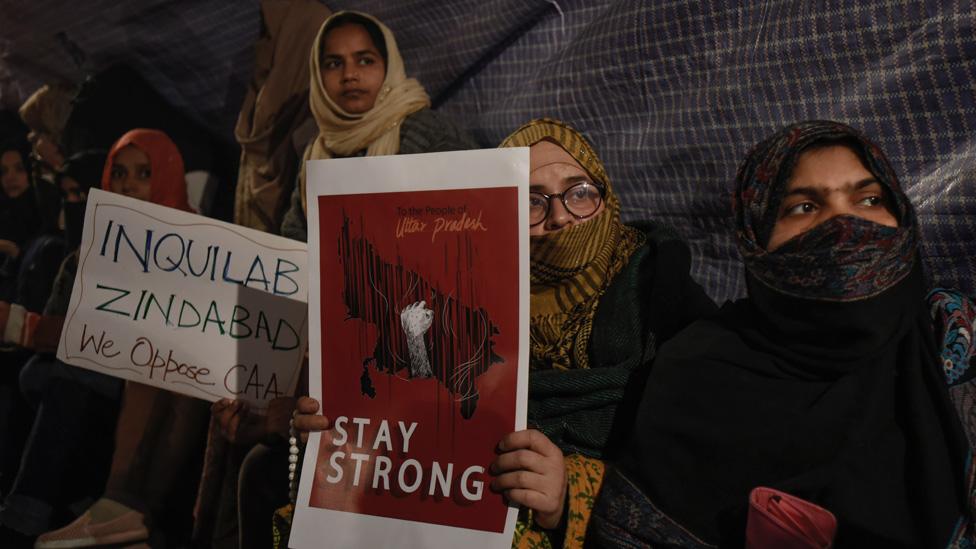
- Published22 March 2020
- Published28 September 2020
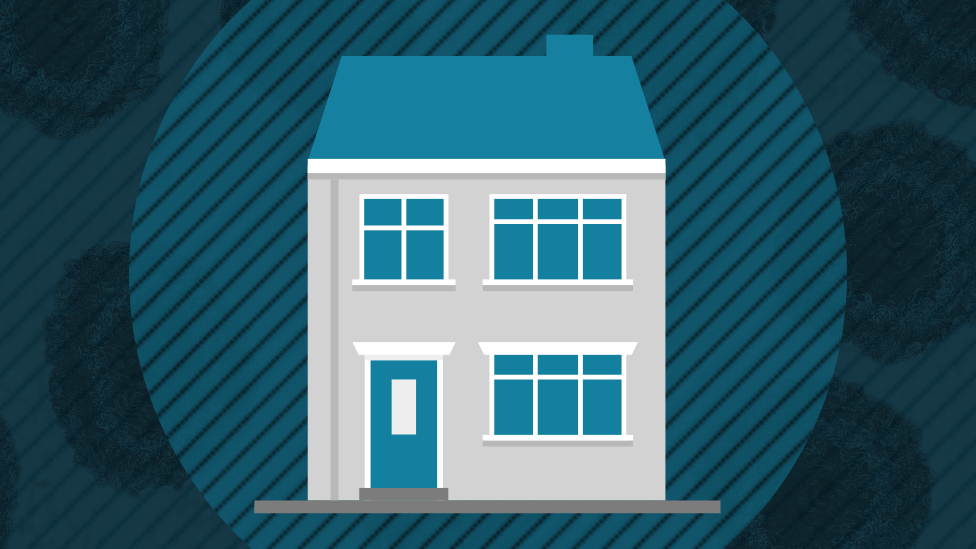
- Published23 March 2020
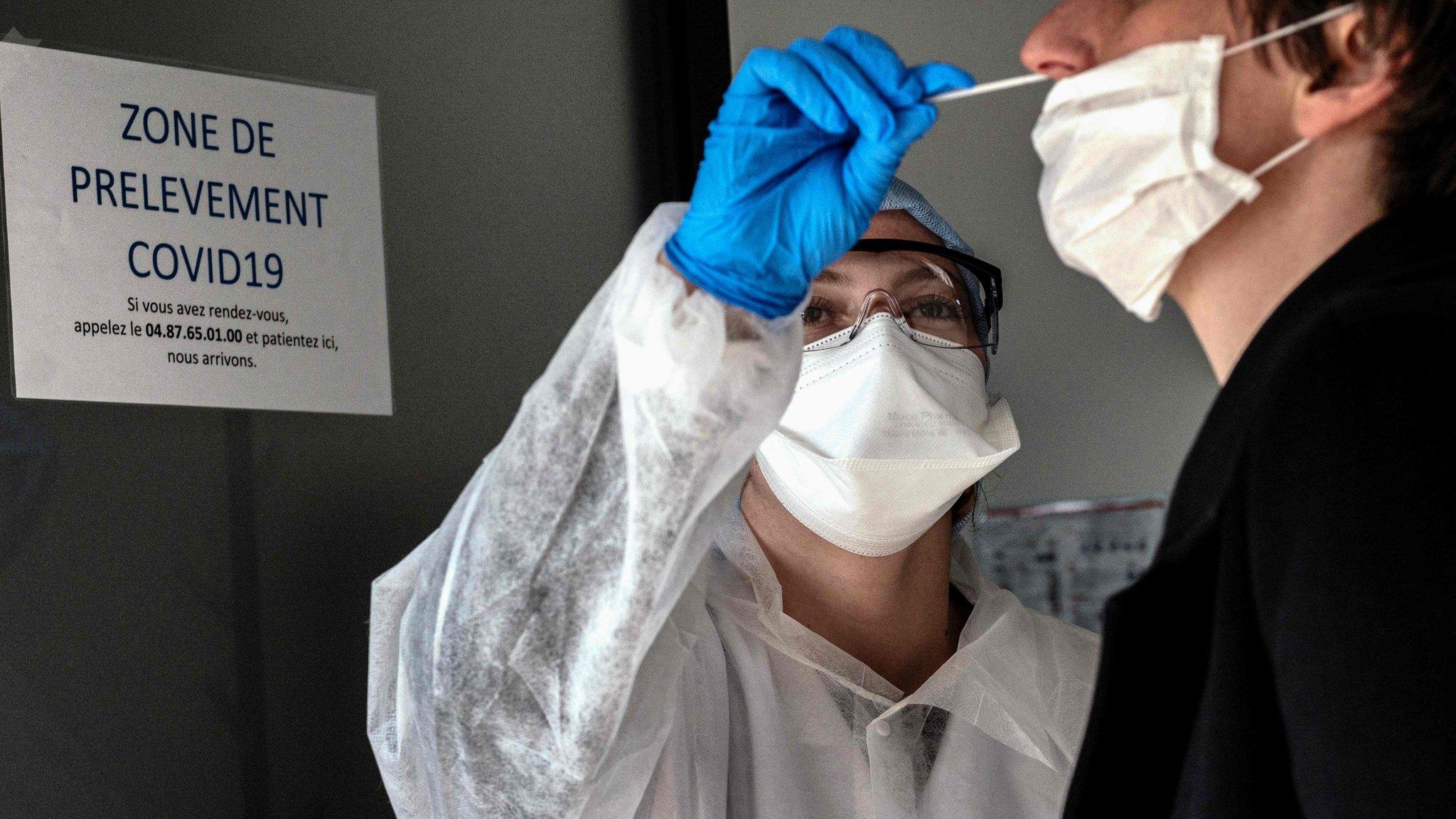
- Published23 March 2020
